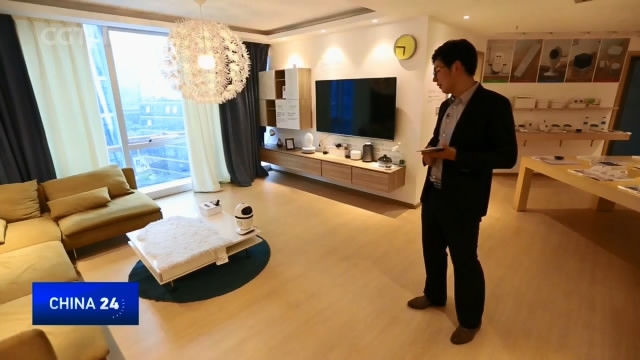
21:09, 22-Feb-2018
New Era, New Journey: Smart home technology playing a bigger role

Thanks to the rise of the Internet of Things and Artificial Intelligence, our homes are getting even smarter. In today's episode of our tech frontier series, we decipher a futuristic technology, and find out how smart homes are becoming a part of our daily lives.
Cleaning Robot is probably the most commonly seen smart home device these days, with a growing number of users. Li Jingjing is one of them.
LI JINGJING CLEANING ROBOT USER "Before I got the robot, when I needed to clean the floor at home, I had to find the time to do it, maybe twenty minutes or half an hour, but now I don't even need to think about it. I can have the robot clean whenever I want with just a touch of a button on my phone."
Another less common, but increasingly popular smart home device is Smart Lock. Cui Jianbin, a businessman who lives in Shenzhen, is a user of this fairly new product.
CUI JIANBIN SMART LOCK USER "When my child comes home, I'm usually still at work at that time. The Smart Lock can automatically send me notifications telling me that my daughter is back home. Because parents are always worried about children playing at school or somewhere else after school, and not coming home on time, so I think it is a good way to keep track of them."
A growing number of smart devices have emerged and connected to the so-called Internet of Things. The concept which covers a wider range of connected ecosystems, such as smart traffic, smart health. And the smart home is believed to be the first Internet of things category to reach maturity.
GAO ZIGUANG, DIRECTOR SMART HOME DEPARTMENT, XIAOMI "Digitalization helps devices perform based on scenarios. Once achieving digitalization, light's power switch or the state of any other device can be known. You can program how the doors or windows open and the state that a house should be in when there's no one there."
With a smart home system in place, you easily turn on and turn off home devices such as the lights, TV, and air conditioner. This is especially useful for forgetful users, who no longer need to worry if they forget to turn off the lights or close the door.
Unlike tech firms, who take advantage of their cutting-edge know-how, traditional home appliance producers rely on their manufacturing expertise, marketing channels, and services. As big companies are hoping to bank on their expertise and experience to thrive in a still-fledgling industry, smaller players are also riding the waves.
According to an A. T. Kearney report, the global smart home market will grow five-fold to $ 50 billion US dollars by 2020.With domestic and foreign companies pouring into the smart home market, this sector looks set to become China's next investment bonanza.

SITEMAP
Copyright © 2018 CGTN. Beijing ICP prepared NO.16065310-3
Copyright © 2018 CGTN. Beijing ICP prepared NO.16065310-3